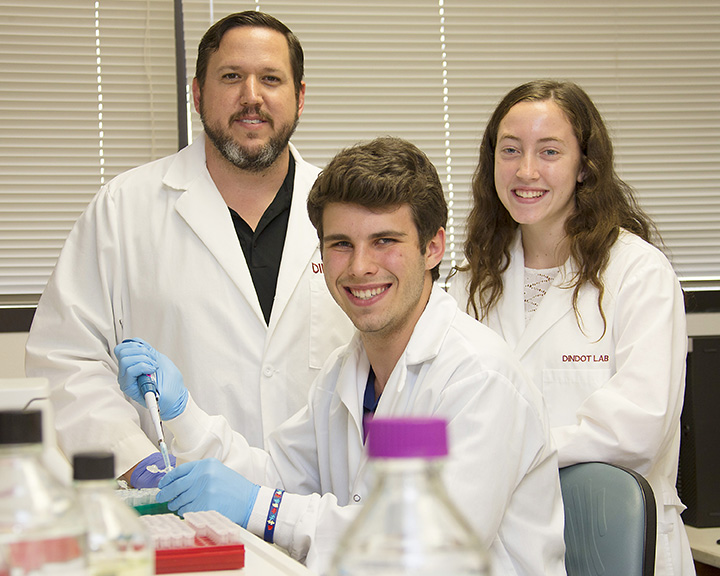Dr. Dindot Working With Students on Autism Research
Through their own initiative, both Dylan Ritter-a sophomore at the University of Mississippi-and Kathleen Nelson-a high school senior from Illinois-discovered Dr. Scott Dindot’s genomics lab. While their friends took off for vacation and summer fun, they chose to come to Texas A&M University to work on autism research with Dindot in the College of Veterinary Medicine & Biomedical Sciences. Their passion is to advance the knowledge of autistic disorders so that others may benefit in the future.

According to the Centers for Disease Control and Prevention (CDC), 1 in 68 individuals have a diagnosis of autism spectrum disorder. Most children are diagnosed when they see a physician. Typically they miss their developmental milestones, but often their parents and other caregivers notice social deficits. Since autism is a spectrum disorder, it varies considerably from individual to individual, but primary signals include social communication deficits, learning disability, and repetitive behaviors.
Ritter and Nelson are interested in autism research because Ritter’s younger brother has Chromosome 15q Duplication syndrome (Dup15q) and Nelson’s older brother has Angelman syndrome, both forms of autism and intellectual disability. Recognizing that both of these young students are exceptional and possess a drive for advancing research in the disorders that have affected their families, Dindot welcomed them into his lab. He was impressed by the drive that brought both students to College Station-away from friends, family, and everyone they know-to help others who have experienced a similar diagnosis.
“Dylan could be doing anything,” Dindot said, “but he’s here. He was awarded a grant from the Autism Science Foundation that supports undergraduate student research. This is an extremely prestigious award, and students from all around the country compete for these funds. The other recipients this year are from Stanford, Yale, and the University of California Santa Barbara. These students are the cream of the crop. This is a national competition. It’s a very competitive, very prestigious award. It’s a credit to Dylan’s drive that he received the grant.”
Ritter – a sophomore at the University of Mississippi – has no connection to Dindot other than the fact that he saw a press release about Dindot’s lab developing a Dup15q mouse model. He contacted Dindot saying that his brother had Dup15q syndrome, and that he wanted to come help and be involved in the research however he could.
Nelson, similar to Ritter, found Dindot through the Foundation for Angelman Syndrome Therapeutics, which funds two autism research projects in Dindot’s lab . Kathleen wants to be a physician and was looking for things to do that will help her achieve that goal. Because of her brother’s condition, she asked her family if she could work in Dindot’s lab and learn about what they’re doing.
“Both of these students are very similar in terms of the emotional connection to this work,” Dindot said. “It’s a very personal, extremely important topic. They’ve chosen to pursue this with that in mind. They could be doing anything during their summer break, but they are here at A&M researching the conditions that affect their siblings. I can’t think of anything more commendable or inspirational.”


